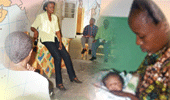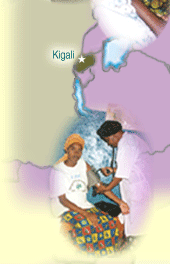
Beginning in 2000, PRIME II assisted the Ministry of Health in building the capacity of primary providers to respond to Rwanda’s tremendous need for decentralized family planning and reproductive health (FP/RH) services. Funded by USAID/Rwanda and carried out in the context of Rwanda’s recovery from civil war and genocide, PRIME’s work included drafting a national RH policy, which was signed by the minister of health in July 2003, developing training modules in family planning and safe motherhood, strengthening nursing school pre-service education and in-service training for providers of FP/RH services, and revising FP/RH standards. From supportive supervision visits at providers’ facilities to assisting the MOH in a national campaign to promote FP, PRIME II’s wide-ranging activities in Rwanda included community-level interventions in seven of the country’s 39 health districts: Bugesera, Byumba, Gitwe, Kabgayi, Kabutare, Kibuye and Mugonero.
Improving Provider Performance
Using the Performance Improvement (PI) approach, PRIME II conducted a performance needs assessment in 2001 and selected training and non-training interventions to strengthen provider performance in family planning and maternal health (including prenatal care, labor and delivery, postnatal consultations, STI/HIV/AIDS counseling and PMTCT services). Prior to the interventions, providers lacked a clear understanding of their jobs, systematic and timely feedback, and the required knowledge and skills for their work. They also felt they were not receiving adequate organizational support to perform well. In 2004, an evaluation team gauged the effect of PRIME’s interventions by assessing 44 providers at 32 facilities in six target health districts.
Key Results: The evaluation showed that the PRIME II program in Rwanda achieved its expected results and strengthened the systems and local capacity that support provider performance. Of providers assessed (n=44), 90% knew their service objectives or desired results, 86% were receiving regular feedback on their performance, 61% declared they received support for their work, and 48% said they were satisfied with the support received. Provision of equipment and supplies and support for renovation of facilities enhanced the working environment for service providers in most of the PRIME-supported facilities. District capacity to conduct supportive supervision was also strengthened.
Observation scores for providers showed improvement from baseline to endline in postnatal consultation (57% to 64%, n=9, n=7), STI/HIV/AIDS counseling (31% to 46.5%, n=7) and management of obstetrical complications (41% to 57%, n=9, n=7), and in the intervention area compared to a control area for PMTCT services (62% vs. 52%, n=80, n=60) and family planning services (64% vs. 51%, n=10, n=18).
The evaluation also indicated that PRIME II interventions had a positive effect on the range and coverage levels of FP/RH services. Twice as many facilities were providing prenuptial and postnatal consultation services as compared with baseline. In addition, more facilities were offering a full range of RH services every day. Service coverage rates increased, particularly for prenatal care and immunization. Coverage rates of FP services, which were less than 1.5% in 2001 in all districts, reached levels as high as 12.6% (Kabgayi health district) in 2004.
Establishing Prevention of Mother-to-Child Transmission of HIV Services
Even when necessary drugs are available, prevention of mother-to-child transmission (PMTCT) of HIV in Rwanda is a major challenge, especially since less than a third of all deliveries are assisted by skilled personnel. As part of a national PMTCT effort, PRIME II established PMTCT services at seven hospitals and health centers. Almost 175 primary providers, laboratory technicians and supervisors were trained in PMTCT counseling, rapid testing, and using computers for data collection. PRIME also assisted in the development of PMTCT protocols, a national PMTCT training guide and a PMTCT supervision checklist. PMTCT services include group and individual counseling during prenatal care, voluntary counseling and testing (VCT), provision of nevirapine to HIV-positive women and their infants, family planning (FP) counseling and services, postpartum care and breastfeeding counseling. PRIME also focused on increasing the involvement of men in PMTCT and FP activities by encouraging women to take home a discreet letter inviting their partners to visit health facilities for VCT, STI prevention and FP counseling.
Key Results: The interventions achieved high rates of counseling and testing for women: 98% of 9,501 women attending prenatal care were counseled between March 2002 and May 2004; 94% of women counseled accepted an HIV test, and 90.5% of the women tested waited or returned for test results. The campaign to reach women’s husbands or sexual partners also showed promising gains, with 22% of partners receiving counseling and 99% of 2,012 partners counseled accepting an HIV test.
Community-Managed Health Care
Even when FP/RH services are readily available, poverty and related lack of financial resources have resulted in low usage of services in Rwanda. In 1999, the government began to encourage the creation of community-managed mutual health organizations (mutuelles) to make primary health care more accessible to underserved residents and promote community involvement in service delivery. PRIME II worked to strengthen mutuelles in five districts, designing and facilitating advocacy campaigns to involve local officials and community leaders as partners in mobilizing members to join and assisting in conducting workshops on administrative and financial management for more than 1,000 people involved in the daily management of mutuelles. Some of the most successful mutuelles benefited from short-term microcredit loan mechanisms set up with assistance from PRIME to enable community members to finance their membership dues without a requirement for personal collateral.
Key Results: The number of mutuelles in the five districts grew from 54 to 90 and overall membership is over 325,000. Membership increased by 135%, to more than 200,000 members, in existing mutuelles in Byumba, Kabutare and Kabgayi districts. The rapid expansion of many new mutuelles supported by PRIME was especially encouraging; for example, the Ruhuha mutuelle in Bugesera district included 17,297 members, or 70% of its catchment area, after a year of operation. Mutuelles have contributed to increased use of services; according to a PRIME II evaluation, a mutuelle member is five times more likely to seek modern health care when sick than a non-member (1.6 versus 0.27 visits per year). Mutuelles also contributed to stronger financial capacity at their partner health facilities, with some generating up to 75% of total revenue for their corresponding health center.
Building Community-Provider Partnerships
Building on Save the Children’s Partnership Defined Quality (PDQ) methodology, PRIME II developed a strategy to link needs assessments and service improvement with community mobilization. PRIME used Integrating Consumer Perspectives tools to strengthen the capacity of the MOH to build partnerships between health providers and the communities they serve, especially to support mutuelles and PMTCT services. To increase mutuelle membership and advocate for health facility improvements such as more personnel, availability of supplies and improved patient flow, PRIME helped establish 22 PDQ teams.
Key Results: Qualitative evidence indicates that PDQ resulted in a shift in the mentality of both providers and clients to a partnership approach—a major change in a society conditioned to top-down authority. Increased collaboration was also noted among different cadres of health volunteers and between the health sector and local government. Specific improvements at each health center resulted from problem-solving and workplans developed through PDQ teams. And, although this cannot be verifiably attributed to PDQ, use of emergency care services increased in health centers where PDQ was implemented and mutuelle membership grew at a faster rate in mutuelles with PDQ teams.
Making Services Gender Sensitive
After assessing the gender sensitivity of provider performance at 41 sites in August 2001, PRIME II field-tested a set of draft Gender Sensitivity Tools for FP/RH Service Providers and Managers in Kabgayi health district. Managers formulated a plan to improve services through more extensive use of the tools and PRIME followed up with providers to determine the extent to which the tools had been applied.
Key Results: Gender sensitivity indicators were integrated in supervisory checklists. A higher percentage of providers (50%) in the intervention districts than in a control district (36%) helped FP clients to negotiate condom use with their partners and explained to both client and partner the HIV/STI risks for newborns.
|











